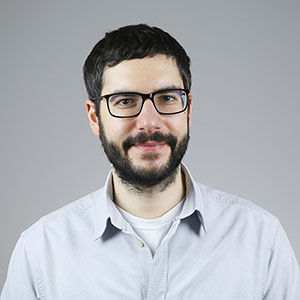Peter Kraker
- Open Knowledge Maps
- https://openknowledgemaps.org/
8 giugno 2021 - SESSIONE 2: SMART CITIES AND COMMUNITIES
Visual discovery for all stakeholders of open science: the Open Knowledge Maps Custom Services

Visual discovery for all stakeholders of open science: the Open Knowledge Maps Custom Services
 Dr. Peter Kraker is the founder and chairman of Open Knowledge Maps, a charitable non-profit dedicated to dramatically increasing the visibility of scientific knowledge for science and society alike. A long-time open science advocate, Peter is known for coining the term Open Methodology and for his leading role in creating The Vienna Principles – A Vision for Scholarly Communication in the 21st Century. Peter is a member of the GO FAIR executive board, coordinator of the GO FAIR Implementation Network on Discovery, and a core team member of the Open Science Network Austria (OANA). Prior to founding Open Knowledge Maps, Peter was a senior researcher at Know-Center of Graz University of Technology, managing the topic of Open Science.
Dr. Peter Kraker is the founder and chairman of Open Knowledge Maps, a charitable non-profit dedicated to dramatically increasing the visibility of scientific knowledge for science and society alike. A long-time open science advocate, Peter is known for coining the term Open Methodology and for his leading role in creating The Vienna Principles – A Vision for Scholarly Communication in the 21st Century. Peter is a member of the GO FAIR executive board, coordinator of the GO FAIR Implementation Network on Discovery, and a core team member of the Open Science Network Austria (OANA). Prior to founding Open Knowledge Maps, Peter was a senior researcher at Know-Center of Graz University of Technology, managing the topic of Open Science.
ABSTRACT
 With millions of papers, datasets, and many other products of the research lifecycle published each year, discoverability has become a question not only of managing the magnitude of the output, but also a multitude of output types. Common search engines providing unstructured result lists are not up to the task: they offer neither an overview of the results nor the necessary context information to be able to evaluate resources correctly. Open Knowledge Maps attempts to transform discovery of scientific knowledge. Instead of lists, we propose to use knowledge maps for discovery. Based on this idea, the charitable non-profit operates the world’s largest visual search engine for research.
In this contribution, we present a novel model that connects Open Knowledge Maps back to library systems and makes it possible to add custom visual discovery services to their offerings. In this model, Open Knowledge Maps acts as a cloud. Similar to Google Custom Search, libraries will be able to embed Open Knowledge Maps discovery services via short snippets in their systems. As all of Open Knowledge Maps’ offerings, the custom services will be provided free of charge. To fund and sustain this infrastructure, we operate a crowdsourcing model: libraries become supporting members of Open Knowledge Maps and provide an annual contribution. In return, the supporting members become part of the organisation’s governance and are directly involved in the decision-making process.
With millions of papers, datasets, and many other products of the research lifecycle published each year, discoverability has become a question not only of managing the magnitude of the output, but also a multitude of output types. Common search engines providing unstructured result lists are not up to the task: they offer neither an overview of the results nor the necessary context information to be able to evaluate resources correctly. Open Knowledge Maps attempts to transform discovery of scientific knowledge. Instead of lists, we propose to use knowledge maps for discovery. Based on this idea, the charitable non-profit operates the world’s largest visual search engine for research.
In this contribution, we present a novel model that connects Open Knowledge Maps back to library systems and makes it possible to add custom visual discovery services to their offerings. In this model, Open Knowledge Maps acts as a cloud. Similar to Google Custom Search, libraries will be able to embed Open Knowledge Maps discovery services via short snippets in their systems. As all of Open Knowledge Maps’ offerings, the custom services will be provided free of charge. To fund and sustain this infrastructure, we operate a crowdsourcing model: libraries become supporting members of Open Knowledge Maps and provide an annual contribution. In return, the supporting members become part of the organisation’s governance and are directly involved in the decision-making process.



